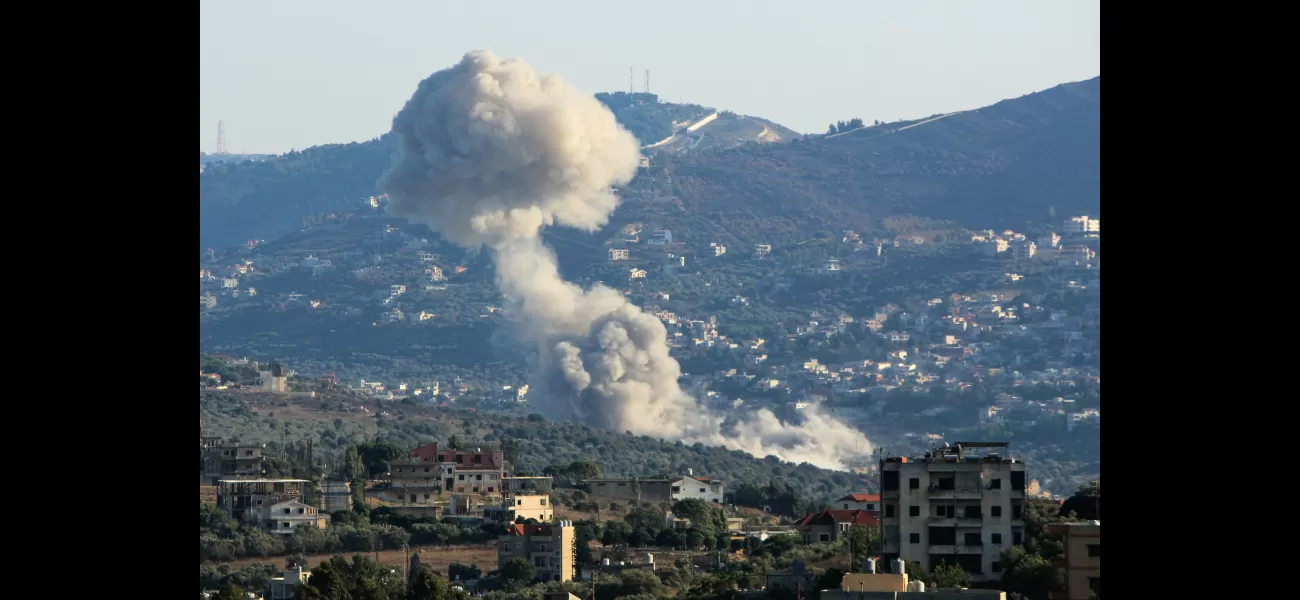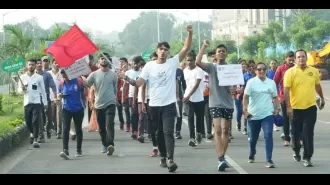I fear the war that will destroy my life.
Fear and anxiety permeate the streets as the entire nation worries about its uncertain future.
August 7th 2024.

The current state of Lebanon is a harsh reality that we are living in. Just imagine having the constant threat of an all-out war at your doorstep. Every day, there are numerous strikes that claim the lives of innocent people. The sound of fighter jets flying low over the capital and breaking the sound barrier is a constant reminder of the danger we are facing. And to make things worse, tens of thousands of people have been forced to leave their homes and become displaced.
We have been caught in the middle of this chaos ever since October 7, when the war in Gaza escalated. As one of Lebanon's closest neighbors, it was inevitable for us to be affected. We are left feeling helpless, watching and hoping that it does not spill over to our country.
Unfortunately, Lebanon is no stranger to conflict with Israel. In 1982, we experienced a devastating war that lasted for 18 years. It was not until 2000 that the 18-year-long Israeli presence in Lebanon came to an end. However, in 2006, there was another violent escalation when the Hezbollah, a powerful militant group here in Lebanon, kidnapped Israeli military officers. This led to a retaliation that turned into a fierce 34-day war, followed by a UN-brokered ceasefire. Since then, there have been periodic skirmishes on both sides of the border, maintaining a constant state of hostility. Currently, there is no peace treaty in place.
The recent assassination of high-ranking military officials in our capital of Beirut and in Tehran, Iran, has put our small country in a vulnerable position. Our political leaders have warned us that retaliation is inevitable, and we must show strength in response. As a result, the people of Lebanon live in constant fear of a full-blown conflict that could tear apart our lives. And in the past week, that fear has felt closer than ever.
The atmosphere on the streets is thick with fear and worry. The entire country is on edge, wondering what will become of us. Plans for birthdays, weddings, and travel have been put on hold. Many people's livelihoods, such as bankers, teachers, and salesmen, have been put on hold as well. We are all waiting for a war that we pray will never happen to be over.
However, for me, as a humanitarian aid worker and representative of Action For Humanity in Lebanon, my work has only intensified. As aid workers, we must ensure that we have finalized our plans with local authorities and have strategies in place for every possible outcome. If the war reaches our doorstep, thousands of people will be forced to flee to safety. They will be left without basic necessities such as food, water, medicine, and shelter. We will do our best to provide for them, but even with all the time in the world, we could not have prepared for the potential fallout of a wider regional conflict.
In fact, my international colleagues from countries like the US, France, and Turkey have been advised by their governments to leave Lebanon. My British friends have already left in the last 48 hours. But even if I had the choice, I wouldn't leave. This is my home, and I, along with Action For Humanity, will do everything in our power to help our people.
For those of us who remember the war of 2006, this is a familiar feeling. However, unlike the previous war, this time, it has been a slow and gradual build-up of tension. People are desperately looking for any chance of escape, whether it's a passport to leave the country or just a safe place to stay away from the potential frontline.
This crisis did not happen overnight. It has been slowly spreading since last October, draining any hope for peace. Unfortunately, many people around the world do not realize how close we are to a catastrophic conflict. It could happen within hours.
Here in Lebanon, fear is at an all-time high, and hope is dwindling. We have seen far too much violence in southern Lebanon, with over 1,700 homes destroyed and 14,000 damaged, and over 500 people killed. But if the conflict spreads, the loss of life, displacement, and suffering will be unprecedented. As humanitarian workers, we are preparing for the worst-case scenario, but praying for the opposite. We do not want what is happening in Gaza to be replicated in Lebanon.
We fear that if war comes to Lebanon, critical infrastructure such as airports, roads, bridges, and power plants will be the first to be destroyed. Our hearts ache as we see schools and hospitals being bombed in Gaza, and we fear that the same fate awaits us. Without electricity and with no way to transport backup power sources, sanitation and plumbing systems will fail. While organizations like ours will prioritize providing clean drinking and bathing water, it will not be enough for the millions of people who may go without.
If all of this were to happen, medical facilities would be crippled, and disease and starvation would follow. Thousands of lives would be lost, and no one would be safe from the war.
Here in Lebanon, fear is widespread, and hope is scarce. But the people of the UK can make a difference. You have a strong voice, and you must use it to call for restraint. Keep lobbying your government to take action and use every platform available to call for a ceasefire in Gaza and to prevent any further conflict in Lebanon. Use social media, contact your MP, donate to organizations working on the ground, take to the streets, and share your opinions with anyone who will listen. When we come together in collective action, we can make a difference.
War is not the solution; it is the problem. The only way to achieve peace is through peace itself. As a humanitarian aid worker, I am committed to helping my people, but we need the support and voices of the international community to bring an end to this crisis. Do you have a story to share? We would love to hear from you. Please get in touch by emailing jess.email and share your views in the comments below. Stay updated with the latest news from Metro by following us on Whatsapp. Together, we can make a difference.
We have been caught in the middle of this chaos ever since October 7, when the war in Gaza escalated. As one of Lebanon's closest neighbors, it was inevitable for us to be affected. We are left feeling helpless, watching and hoping that it does not spill over to our country.
Unfortunately, Lebanon is no stranger to conflict with Israel. In 1982, we experienced a devastating war that lasted for 18 years. It was not until 2000 that the 18-year-long Israeli presence in Lebanon came to an end. However, in 2006, there was another violent escalation when the Hezbollah, a powerful militant group here in Lebanon, kidnapped Israeli military officers. This led to a retaliation that turned into a fierce 34-day war, followed by a UN-brokered ceasefire. Since then, there have been periodic skirmishes on both sides of the border, maintaining a constant state of hostility. Currently, there is no peace treaty in place.
The recent assassination of high-ranking military officials in our capital of Beirut and in Tehran, Iran, has put our small country in a vulnerable position. Our political leaders have warned us that retaliation is inevitable, and we must show strength in response. As a result, the people of Lebanon live in constant fear of a full-blown conflict that could tear apart our lives. And in the past week, that fear has felt closer than ever.
The atmosphere on the streets is thick with fear and worry. The entire country is on edge, wondering what will become of us. Plans for birthdays, weddings, and travel have been put on hold. Many people's livelihoods, such as bankers, teachers, and salesmen, have been put on hold as well. We are all waiting for a war that we pray will never happen to be over.
However, for me, as a humanitarian aid worker and representative of Action For Humanity in Lebanon, my work has only intensified. As aid workers, we must ensure that we have finalized our plans with local authorities and have strategies in place for every possible outcome. If the war reaches our doorstep, thousands of people will be forced to flee to safety. They will be left without basic necessities such as food, water, medicine, and shelter. We will do our best to provide for them, but even with all the time in the world, we could not have prepared for the potential fallout of a wider regional conflict.
In fact, my international colleagues from countries like the US, France, and Turkey have been advised by their governments to leave Lebanon. My British friends have already left in the last 48 hours. But even if I had the choice, I wouldn't leave. This is my home, and I, along with Action For Humanity, will do everything in our power to help our people.
For those of us who remember the war of 2006, this is a familiar feeling. However, unlike the previous war, this time, it has been a slow and gradual build-up of tension. People are desperately looking for any chance of escape, whether it's a passport to leave the country or just a safe place to stay away from the potential frontline.
This crisis did not happen overnight. It has been slowly spreading since last October, draining any hope for peace. Unfortunately, many people around the world do not realize how close we are to a catastrophic conflict. It could happen within hours.
Here in Lebanon, fear is at an all-time high, and hope is dwindling. We have seen far too much violence in southern Lebanon, with over 1,700 homes destroyed and 14,000 damaged, and over 500 people killed. But if the conflict spreads, the loss of life, displacement, and suffering will be unprecedented. As humanitarian workers, we are preparing for the worst-case scenario, but praying for the opposite. We do not want what is happening in Gaza to be replicated in Lebanon.
We fear that if war comes to Lebanon, critical infrastructure such as airports, roads, bridges, and power plants will be the first to be destroyed. Our hearts ache as we see schools and hospitals being bombed in Gaza, and we fear that the same fate awaits us. Without electricity and with no way to transport backup power sources, sanitation and plumbing systems will fail. While organizations like ours will prioritize providing clean drinking and bathing water, it will not be enough for the millions of people who may go without.
If all of this were to happen, medical facilities would be crippled, and disease and starvation would follow. Thousands of lives would be lost, and no one would be safe from the war.
Here in Lebanon, fear is widespread, and hope is scarce. But the people of the UK can make a difference. You have a strong voice, and you must use it to call for restraint. Keep lobbying your government to take action and use every platform available to call for a ceasefire in Gaza and to prevent any further conflict in Lebanon. Use social media, contact your MP, donate to organizations working on the ground, take to the streets, and share your opinions with anyone who will listen. When we come together in collective action, we can make a difference.
War is not the solution; it is the problem. The only way to achieve peace is through peace itself. As a humanitarian aid worker, I am committed to helping my people, but we need the support and voices of the international community to bring an end to this crisis. Do you have a story to share? We would love to hear from you. Please get in touch by emailing jess.email and share your views in the comments below. Stay updated with the latest news from Metro by following us on Whatsapp. Together, we can make a difference.
[This article has been trending online recently and has been generated with AI. Your feed is customized.]
[Generative AI is experimental.]
0
0
Submit Comment





